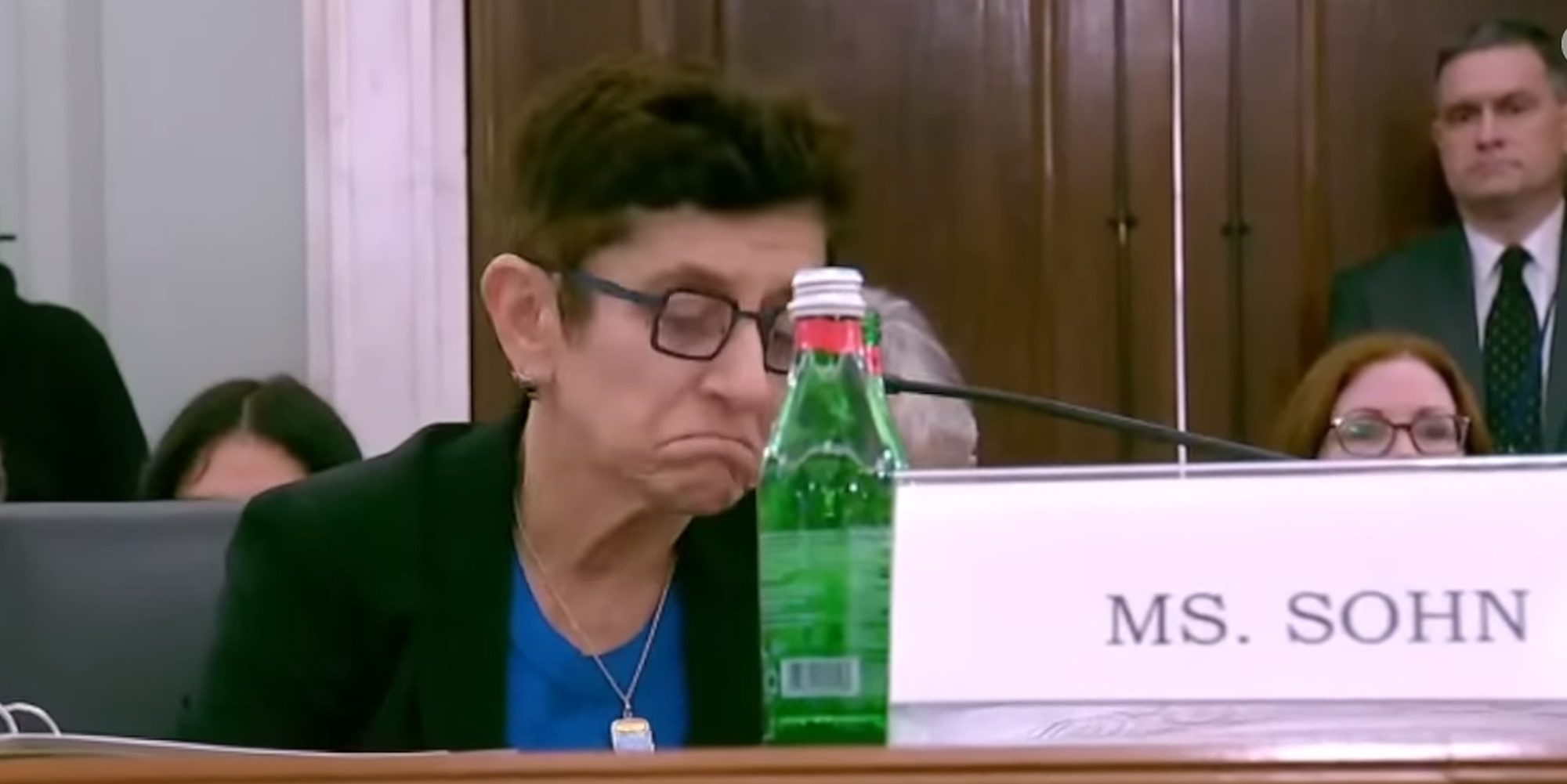Yesterday, after facing down an ugly, year-and-a-half-long, industry-backed campaign, popular telecom and media reformer Gigi Sohn withdrew her nomination to the Federal Communications Committee (FCC). It is the latest in a long line of victories for U.S. telecom monopolies and media giants keen on stymying federal oversight of one of the most disliked industries in America.
And, experts say, it is a startlingly new low point for a government that already constantly fails to protect the public interest against the whims and profit-seeking motivations of big telecom.
“Sohn's nomination was marred by right-wing extremist attacks that centered on misinformation and politics of division and hate rather than her record and role at the FCC,” Demand Progress Communications Director Maria Langholz told the Daily Dot. “While it would be easiest to blame the right-wing for her nomination failing, there was missing urgency and commitment from Democrats in the White House and Senate.”
Sohn, who would have been the first LGBTQ commissioner in agency history, is broadly popular across both sides of the aisle, with significant experience across government and consumer advocacy. But a coordinated smear campaign by the industry—peppered across major outlets—cast her as an anti-police, pro-censorship radical and had its intended effect, Sohn said in a statement.
“When I accepted his nomination over sixteen months ago, I could not have imagined that legions of cable and media industry lobbyists, their bought-and-paid-for surrogates, and dark money political groups with bottomless pockets would distort my over 30-year history as a consumer advocate into an absurd caricature of blatant lies,” Sohn said. “The unrelenting, dishonest and cruel attacks on my character and my career as an advocate for the public interest have taken an enormous toll on me and my family.”
With Sohn’s nomination now scuttled, the Biden FCC remains stuck in policy purgatory without a voting majority, despite being mandated one by law as the party in control of the White House.
Without it, the agency can’t hold wireless companies accountable for playing fast and loose with user location data, can't take broadband providers to task for years of refusing to upgrade low-income and minority neighborhoods, and can't police a cable industry that has spent years tacking on nonsensical fees.
As the Daily Dot reported, President Joe Biden delayed nominating Sohn for nine months, giving the telecom industry ample runway to craft an opposition campaign. Key Democratic leaders then failed to whip the needed votes, folded to GOP demands to hold repeated, unnecessary hearings, and failed to publicly support Sohn as she faced down attacks alone.
Sohn’s nomination never appeared to be a meaningful priority for the Biden administration, which in recent days has intervened to pressure Congress to be tougher on TikTok, but never publicly expressed concern that the nation’s top telecom and media regulator has spent years mired in regulatory gridlock by the telecom lobby.
“This nomination process was bungled almost from the start, with a long wait in selecting the nominee in the first place, three different confirmation hearings, and endless excuses for why various senators weren’t ready to vote,” Craig Aaron, co-CEO of consumer rights group Free Press told the Daily Dot. “All this dithering and delay allowed the industry to refuel their attack machine, bankroll front groups, and deploy legions of lobbyists against Sohn.”
A source close to the nomination process also lamented a consistent lack of urgency by Senate Majority Leader Chuck Schumer (D-N.Y.) and the White House, which helped further doom Sohn’s struggling nomination.
Even Sohn’s potential Democratic future colleagues at the FCC, Chairwoman Jessica Rosenworcel and Commissioner Geoffrey Sparks, failed to publicly and meaningfully support Sohn as attacks on her became increasingly unhinged and homophobic.
While the GOP routinely operates in policy lockstep with telecom monopolies (such as when the GOP-controlled Senate blocked the FCC from protecting broadband consumer privacy in 2017), Sohn’s nomination was ultimately scuttled by the waffling of a handful of Democratic senators, including Sen. Mark Kelly (D-Ariz.), Sen. Catherine Cortez Masto (D-Nev.), and Sen. Joe Manchin (D-W.V.), the last of whom only confirmed his opposition publicly on Tuesday.
A source familiar with the nomination roadblocks also stated that Sen. Jacky Rosen (D-Nev.), Sen. Kyrsten Sinema (I-Ariz.), and Sen. Jon Tester (D-Mont.) contributed to some last-minute waffling that prevented Sohn from even being voted out of committee unless they received assurances she’d be confirmed by the full Senate, which they say, according to a source, Masto prevented from happening.
Axios first reported that the trio of senators was waffling on Sinema. All three previously voted for her in her last confirmation hearing. Rosen, Sinema, and Tester did not respond to Daily Dot requests for comment.
“Unfortunately, the abject failure of Democratic leaders to stand up and advocate for their own nominee means that these companies will likely only double down on the kinds of deceitful and dirty tactics they deployed against Sohn,” Aaron said. “What other lessons could they draw from how easily senators folded in the face of easily fact-checked lies and slanders—including by their former colleagues who are now on the corporate payroll.”
That came from a separate, additional smear campaign spearheaded by industry lobbyist and former Democratic senator Heidi Heitkamp. Heitkamp’s campaign falsely claimed that Sohn wasn’t interested in ensuring that rural Americans had access to affordable broadband, despite that being a central thrust of Sohn’s mission at consumer group Public Knowledge.
Heitkamp’s false claims that Sohn opposed delivering broadband to rural Americans was the basis of a line of questioning during Sohn’s second confirmation hearing by Sen. Dan Sullivan (R-Alaska).
Masto similarly cited numerous false claims seeded by the industry that Sohn had “serious animus” against law enforcement.
A source familiar with the nomination process indicates that Sohn had the full support of Biden, prompting him to renominate her at the beginning of the year. But without the support of key Democratic senators or her future FCC colleagues, Sohn was unable to get the 51-vote majority in the Senate needed for confirmation.
Sohn’s experience was in stark contrast to the Trump administration’s FCC appointment of Nathan Simington, whose confirmation process took all of 28 days despite widespread concerns about his lack of meaningful telecom industry experience.
In a statement, Manchin claimed his opposition to Sohn was primarily based on his desire to see a less “partisan” agency. Sohn’s cardinal offenses appear to have been several old tweets supporting police reform and calling Fox News “state-sponsored propaganda.”
“The FCC must remain above the toxic partisanship that Americans are sick and tired of, and Ms. Sohn has clearly shown she is not the person to do that,” Manchin said. “For those reasons, I cannot support her nomination to the FCC, and I urge the Biden Administration to put forth a nominee who can bring us together, not drive us apart.”
Yet Manchin supported the nomination of Trump FCC boss Ajit Pai, whose agency was not only nakedly partisan, but was routinely mired in numerous controversies as it delivered just about everything telecom and media giants wanted, from the repeal of popular net neutrality rules, to the stripping away of longstanding media consolidation restrictions.
Not only did the Trump FCC effectively neuter the agency’s consumer protection authority, it even attempted to ban states from protecting broadband consumers, something the courts haven’t looked kindly upon.
Between Trump and the Sohn fracas, the agency has now spent six straight years on the sidelines courtesy of telecom industry lobbying.
As it stands, the Biden administration will need to nominate a new candidate to fill the empty seat at the FCC. That nomination process, even if industry approves of the new pick, will likely be dragged out indefinitely, leaving the agency incapable of implementing meaningful reform before the next presidential election risks once-again shifting control of the FCC.
That’s a particular problem given the federal government is preparing to dole out more than $45 billion in broadband subsidies made possible by the recently passed infrastructure bill. Who gets that money will be determined by an FCC whose broadband maps have been routinely criticized for being an inaccurate mess.
“If I don’t get confirmed at all, there’s not going to be a fifth person on the FCC in time to do anything about those maps,” Sohn warned during a third hearing earlier this year. Sohn noted her experience with numerous state leaders would have proved invaluable in the agency’s effort to ensure an historic round of broadband subsidies were dispersed equitably.
As it turns out, Sohn will never get that chance.
“It is a sad day for our country and our democracy when dominant industries, with assistance from unlimited dark money, get to choose their regulators,” Sohn said. “And with the help of their friends in the Senate, the powerful cable and media companies have done just that.”







